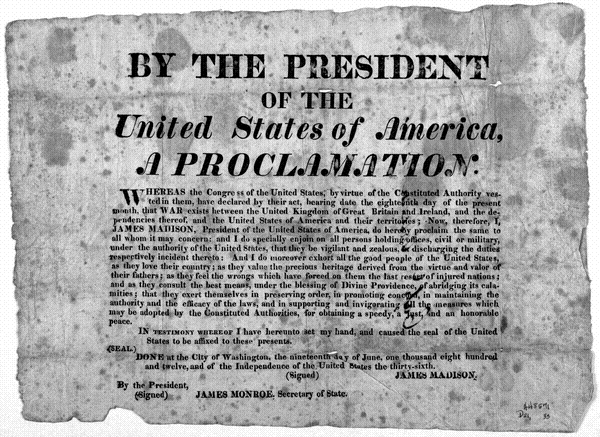“I believe that in four weeks from the time a declaration of war is heard on our frontier, the whole of Upper Canada and a part of Lower Canada will be in our power.” --War Hawk Representative John C. Calhoun, 1812

Library of Congress, Rare Book and Special Collections Division.
Frustrated by the failure of President Jefferson’s policies of economic coercion, some members of the Twelfth Congress began calling for more decisive and aggressive measures. Known as the “War Hawks,” they were mostly young politicians from hailing from the West and South. Led by new Speaker of the House Henry Clay, this small group of Jeffersonian Republicans pressed for a military confrontation to redress American grievances.
Clay argued that, though France and Britain had both done harm to the United States, Britain was the greater offender. Britain’s tightening rules on neutral trade frustrated American merchants, and the British policy of impressment was particularly galling to Americans. Clay reasoned that because Canada was so vulnerable, an attack on the British colony would force Britain to make concessions on both issues. At the same time, the conquest of Canada would remove a longstanding threat to America’s security on the North American continent and restore national honor.
An astute politician, Clay made sure that the War Hawks were well represented in key congressional committees. There were five War Hawks, including John C. Calhoun, on the Foreign Relations Committee, and War Hawks chaired the Naval, Ways and Means, and Military Affairs Committees.
While the War Hawks could be vocal proponents of war, they were also committed to waging it on the cheap. Tight purse-strings betrayed a certain tentative quality to the War Hawks’ march to war. Samuel McKee of Kentucky, for example, strongly favored a ground invasion Canada, but voted against the construction of new frigates as too costly. Another War Hawk, William Wright of Maryland, repeatedly voted against raising taxes to fund the war.
The vote for war ultimately passed along strict party lines. The House vote was 79 to 49; the Senate vote was 19 to 13. All 98 who voted in favor of war were Republicans. Not a single Federalist voted in favor. A small group of Republican firebrands had managed to enlist enough of their fellow party members to vote in favor of conflict with Great Britain, but the decision to plunge the nation into war remained a hotly contentious one even as the fighting raged.
Last updated: May 24, 2016
